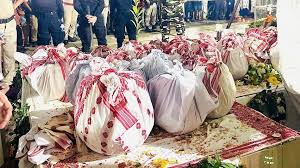
Assam to Distribute Zubeen Garg’s Ashes via Online Application; Memorials Set Up at Kamarkuchi and Jorhat

 :
| Updated On: 24-Sep-2025 @ 1:20 pm
:
| Updated On: 24-Sep-2025 @ 1:20 pmSHARE
The Assam government has announced a historic initiative to make the ashes of legendary singer and cultural icon Zubeen Garg available to organisations and individuals through an online application system. This step, overseen by the state’s Cultural Department, allows citizens and institutions to pay tribute to the late artist and retain a portion of his remains as a symbol of respect and remembrance. The initiative reflects the deep cultural and emotional bond that the people of Assam shared with Garg, who was widely regarded not just as a singer and composer but as a unifying cultural figure whose music resonated across generations.
Education and Cultural Affairs Minister Ranoj Pegu detailed the process at a press briefing held in Kamarkuchi, on the outskirts of Guwahati, where Garg was cremated with full state honours on September 22. Pegu explained that the government would create a simple and user-friendly online portal to manage applications from organisations and individuals. Requests from institutions will be given priority, and if ashes remain after fulfilling these institutional applications, individual applicants will also be considered. The minister emphasised that the process would be transparent, systematic, and accessible to all who wish to honour the late singer’s legacy.
Garg, aged 52, passed away unexpectedly on September 19 in Singapore while swimming in the sea. His sudden death shocked the nation, triggering widespread grief and an outpouring of emotions across Assam and among his global fans. His mortal remains were brought to Assam on Monday, where thousands of mourners lined the streets to pay their last respects as his coffin was transported to the state capital. The final rites were conducted at Kamarkuchi, marking a solemn occasion attended by government officials, family, friends, and countless admirers.
In the aftermath of the cremation, the government has taken steps to ensure that the site of the pyre is preserved and secured. Minister Pegu confirmed that the pyre area will be secured immediately, with the construction of a permanent boundary wall and demarcation work already in progress. Additionally, a state police camp will be established at the memorial site to provide security while keeping it accessible for the public to offer homage. This ensures that the memorial space remains a safe and respectful place for citizens to honour Garg’s memory.
As part of this commemorative effort, a portion of Garg’s ashes will also be taken to Jorhat, the town where he spent his formative years. Rituals associated with the 13th day of his demise will be performed in Jorhat, and a permanent memorial dedicated to the singer will be constructed there. The selection of the site for the Jorhat memorial is currently underway, reflecting the government’s commitment to preserving Garg’s legacy across multiple locations in the state.
For the people of Assam, Garg was far more than a musician. He was a cultural bridge, whose songs and compositions created a shared sense of identity and belonging among different generations. The government’s decision to make his ashes available to organisations and individuals represents an effort to honour both the personal and collective connections that the late singer had fostered. By providing access to a part of his mortal remains, the initiative allows citizens to express their reverence and ensures that Garg’s cultural and emotional impact continues to resonate across Assam and beyond.
This initiative also reflects the state government’s recognition of Garg’s contribution to Assamese culture and the importance of memorialising cultural icons in ways that allow public participation and engagement. It underscores the government’s commitment to preserving the legacy of its most cherished artists while fostering a sense of community and cultural pride.